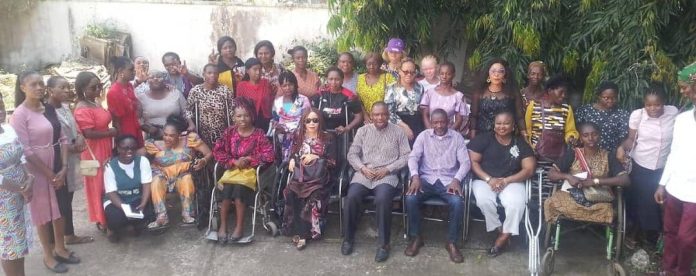By Leonard Okachie
Umuahia, Dec. 9, 2024
The Chairman of the Abia State Disability Commission, Mr. David Anyaele, has raised concerns about the persistent exclusion of women with disabilities in critical conversations about Gender-Based Violence (GBV). According to him, the voices of these women are often overlooked, leaving them vulnerable and underrepresented in efforts to address GBV effectively.
Anyaele made this assertion during a “Dialogue on Sexual and Gender-Based Violence and Women with Disabilities” held in Umuahia. The event was organized by the Abia State Disability Commission in support of the First Lady, Lady Priscilla C. Otti’s campaign to combat GBV.
The dialogue was part of the global 16 Days of Activism Against Gender-Based Violence campaign, an annual international movement aimed at eradicating violence against women and girls (VAWG). The campaign runs from November 25, the International Day for the Elimination of Violence Against Women, to December 10, International Human Rights Day.
Speaking passionately at the event, Anyaele, himself a person with a disability, highlighted the systemic neglect faced by women with disabilities in conversations and policy-making on GBV.
“In many states and even at the national level, you see our women struggling and fighting to be recognized, to be included, and to have their voices heard in the discussions that affect their lives. It is disheartening that their unique experiences and solutions are often ignored,” he lamented.
A Platform for Voices to Be Heard
The dialogue aimed to empower women with disabilities by amplifying their voices, raising awareness about their plight, and driving collective action toward a more inclusive and prosperous Abia State. Participants were drawn from various clusters within the disability community, including the deaf, blind, physically challenged, individuals with intellectual disabilities, persons with albinism, and those with autism spectrum disorders (IDEA).
During the interactive sessions, the women shared deeply personal and often harrowing experiences of discrimination, exclusion, and abuse. These testimonies painted a stark picture of the challenges they face, not only from society at large but also from government agencies and institutions.
A recurring theme among the participants was their lack of awareness about the legal protections available to them under state and national laws addressing GBV. They expressed frustration over the absence of organizations or initiatives that had enlightened them about their rights or provided support in navigating these issues.
Calls for Action
Arising from their group discussions, participants emphasized the urgent need for capacity-building and advocacy initiatives tailored to the unique needs of women with disabilities. They called on the Abia State Disability Commission to collaborate with the state Ministry of Justice to design and deliver training programs on GBV prevention, legal protections, and survivor support mechanisms.
“Shockingly, none of us are familiar with the laws that are meant to protect us. We need education, advocacy, and support to defend our rights,” one participant noted.
Anyaele reassured the participants of the commission’s commitment to their cause. He pledged that the insights and suggestions gathered during the dialogue would be catalogued and presented to the First Lady for further action.
“This is not a one-off event,” Anyaele said. “We are committed to ensuring that women with disabilities are no longer invisible in GBV discussions and interventions. Your voices will be heard, and your needs will be prioritized.”
A Promise to Do More
Acknowledging the importance of inclusivity, Anyaele promised to extend similar interactive sessions to men with disabilities. “This is just the beginning. We will continue to engage all members of the disability community to ensure no one is left behind in our fight against GBV,” he stated.
He also expressed gratitude to the First Lady for her unwavering support and to the participants for sharing their experiences and recommendations.
Building a Safer Future for All
As the event concluded, it became clear that this dialogue was more than just a meeting—it was a rallying call for justice, inclusion, and systemic change. By bringing the issues of women with disabilities to the forefront, the Abia State Disability Commission has set a precedent for other states and stakeholders to follow.
The First Lady’s advocacy, combined with the commission’s efforts, offers hope that the fight against GBV in Abia State will become more inclusive, ensuring that no woman, regardless of ability, is left behind in the quest for safety, dignity, and equality.
A Broader Perspective
The dialogue underscored the critical importance of intersectionality in addressing GBV. Women with disabilities face compounded challenges that require tailored solutions. As the global community observes the 16 Days of Activism Against GBV, the voices of these women serve as a powerful reminder that true progress can only be achieved when every voice is heard, and every life is valued.
Through continued advocacy and deliberate action, Abia State can pave the way for a safer and more inclusive society, where women with disabilities are not only part of the conversation but also at the heart of the solution.


